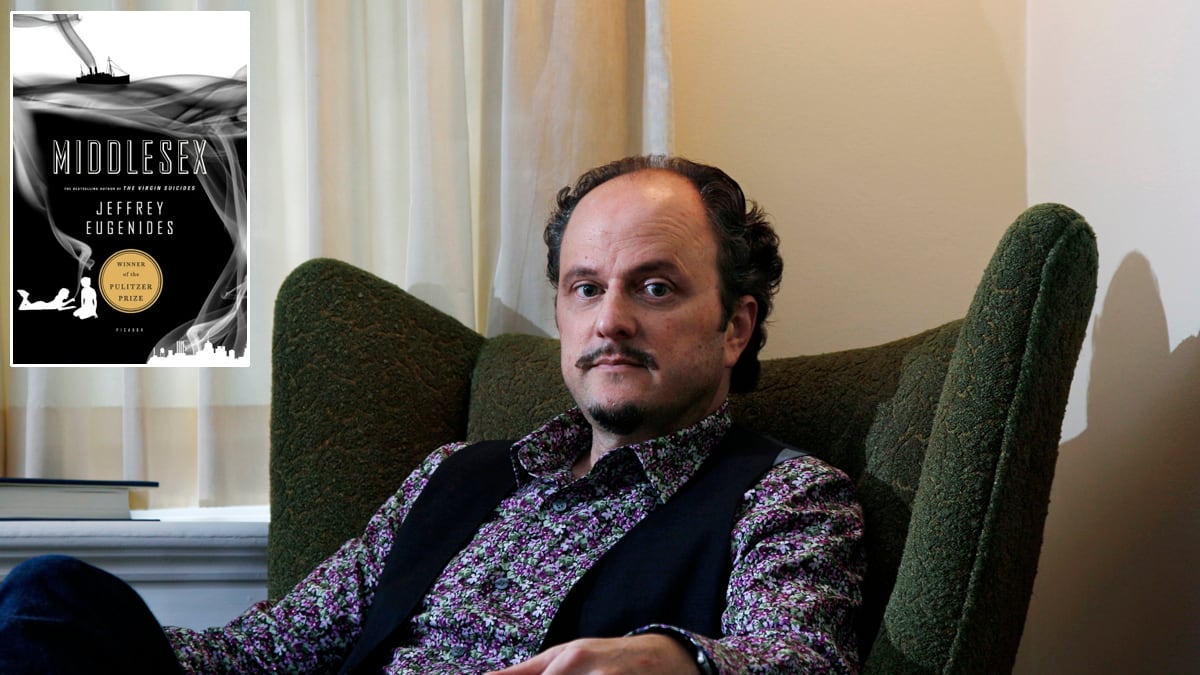By 2002, in the world’s major cities, it was no longer possible to determine a stranger’s ethnicity by sight:
You used to be able to tell a person’s nationality by the face. Immigration ended that. Next you discerned nationality via the footwear. Globalization ended that. Those Finnish seal puppies, those German flounders—you don’t see them much anymore. Only Nikes, on Basque, on Dutch, on Siberian feet.
Nike, the Greek goddess of victory, reigned victorious. But what had been lost?
Jeffrey Eugenides’ Middlesex disguises itself as the memoir of Calliope (later Cal) Stephanides: b. 1960, Greek-descended, Detroit-born, U.S. diplomat, dark-haired, big-nosed, closet hermaphrodite. But of Calliope’s life story we witness relatively little: birth and childhood, and adolescent sexual consternation. Then, after a gap of a quarter century, we get the early glimmerings of a love affair set in the present day, when Cal is forty-one and living in Berlin. Eugenides’ focus instead is on the travails of Cal’s grandparents and parents. (Cal is not even born until page 216.) Even the sections about Cal’s youth are frequently interrupted by divergences into the stories of his ancestors. As a result Middlesex presents a view of history that is as determinative and linear as you will find in any Greek myth. The son not only inherits the sins of the father, but also the sins of the mother, grandfather, grandmother, a few other cousins, and aunts and uncles.

As the Stephanides family travels through the 20th century, they have a knack—a Forrest Gumpian knack—for stumbling into Major Moments in American history. Lefty and Desdemona, having fled Smyrna during the Turkish massacre of Greeks in that city, arrive at Ellis Island in 1922 and embark on a familiar immigrant story. They follow a cousin to Detroit, where Lefty takes an assembly-line job at Ford Motor Company. Later he finds greater profit in running rum across the Canadian border and squiring his own speakeasy until the end of Prohibition. Desdemona, providentially finding employment at a Detroit mosque, witnesses the founding of the Nation of Islam. After interludes in World War II and the Korean War (Milton, Cal’s father, joins the Army), Eugenides stages a set piece during Detroit’s own civil war, the 1967 race riot. Cal’s brother becomes a hippie, Cal hitchhikes to San Francisco and squats with Deadheads in Golden Gate Park, and as Milton watches the Watergate hearings, he transforms into a Greek Richard Nixon.
But Eugenides’s theme is not American history so much as history itself—its power and influence. We follow the Stephanides family saga through the decades in order to solve a riddle: what has made Cal Stephanides the way he is? Every detail provides a clue, which leads to another, the past conspiring to create a future in its own image. This is the domino-effect theory of history: in 1922, a lonely woman succumbs to the sexual advances of her brother in a rural Turkish village; in 1946 their son marries his own cousin; in 1960, the doubled act of incest, bringing to prominence a recessive gene, produces a hermaphrodite.
In Middlesex history is not just determinative; it is also cyclical. The bonfires of Detroit in 1967, for instance, recall the Great Fire of Smyrna in 1922. But the novel’s historical parallels tend to be more portentous than logical: “My grandparents had fled their home because of a war. Now, some fifty-two years later, I was fleeing myself.” Or: “Back in 1933, a disembodied voice had spoken to my grandmother through the heating grate. Now, forty-two years later, a disguised voice spoke to my father over the phone.” To know the past, Eugenides suggests, is to understand the present. Which is why, of the novel’s 529 pages, more than 500 of them are set in the past. The present is superfluous: everything has already been ordained.
“In this life we grow backwards,” writes Eugenides. “Living sends a person not into the future but back into the past, to childhood and before birth, finally, to commune with the dead. You get older, you puff on the stairs, you enter the body of your father. From there it’s only a quick jump to your grandparents, and then before you know it you’re time-traveling.”
This time-traveling logic gives Middlesex its structure, and as a philosophy it’s cheering. For if the past determines the present, then it follows that the way we lead our own lives will shape the lives of those who come after us. It’s the Christian theme; our actions will be rewarded or punished, if not in heaven or hell then in the fate of our descendents. It means that man controls his destiny. This impulse to seek an underlying order makes particular sense for a novel written at the turn of the 21st century, when the old identities had blurred irretrievably and it had become more difficult than ever to know yourself, even if you looked down at your own feet.
It’s a hopeful philosophy but even Eugenides understands its limitations. For if you follow the thread back long enough, it begins to shred. “The thread,” he writes of Cal, “began on a day two hundred and fifty years ago, when the biology gods, for their own amusement, monkeyed with a gene on a baby’s fifth chromosome.” Who are these biology gods and why did they monkey with the baby’s chromosome in the first place? We’ll never know, and we never can. Chaos wins out in the end. That does not mean that man can’t rage against it. Ultimately Middlesex is an ode to storytelling—to the power of stories to create a sense of order, even though we know that none exists.
Other notable novels published in 2002:
The Book of Illusions by Paul AusterThe Emperor of Ocean Park by Stephen L. CarterBig If by Mark CostelloYou Shall Know Our Velocity by Dave EggersEverything Is Illuminated by Jonathan Safran FoerNowhere Man by Aleksander HemonRoscoe by William KennedyGorgeous Lies by Martha McPheeThe Lovely Bones by Alice SeboldThe Little Friend by Donna Tartt
Pulitzer Prize:Empire Falls by Richard Russo
National Book Award:Three Junes by Julia Glass
Bestselling novel of the year: The Lovely Bones by Alice Sebold
About this series:
This monthly series will chronicle the history of the American century as seen through the eyes of its novelists. The goal is to create a literary anatomy of the last century—or, to be precise, from 1900 to 2012. In each column I’ll write about a single novel and the year it was published. The novel may not be the bestselling book of the year, the most praised, or the most highly awarded—though awards do have a way of fixing an age’s conventional wisdom in aspic. The idea is to choose a novel that, looking back from a safe distance, seems most accurately, and eloquently, to speak for the time in which it was written. Other than that there are few rules. I won’t pick any stinkers.
Previous Selections:
1902—Brewster’s Millions by George Barr McCutcheon 1912—The Autobiography of an Ex-Coloured Man by James Weldon Johnson 1922—Babbitt by Sinclair Lewis 1932—Tobacco Road by Erskine Caldwell 1942—A Time to Be Born by Dawn Powell 1952—Invisible Man by Ralph Ellison 1962—One Flew Over the Cuckoo’s Nest by Ken Kesey 1972—The Stepford Wives by Ira Levin 1982—The Mosquito Coast by Paul Theroux1992—Clockers by Richard Price






